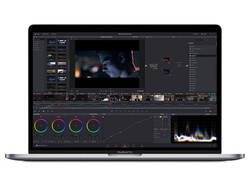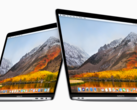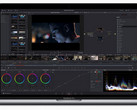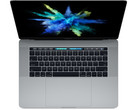Apple MacBook Pro 15 2018 (2.9 GHz i9, Vega 20) Laptop Review

In a somewhat surprising move, Apple announced two new GPUs for the MacBook Pro 15 in the end of last year. They are completely new Vega GPUs from AMD. While the two regular Radeon Pro chips (555X & 560X) are still based on the older GCN4 architecture, the two Radeon Pro Vega GPUs are based on the GCN5 architecture. However, the thermal output is most likely similar (35 watts), so we will have to wait for the benchmark results to see how big the performance advantage really is. Apple only offers the two new GPUs as upgrades for the more expensive SKU, so you have to pay another 300 Euros (~$338/Radeon Pro Vega 16) or 420 Euros (~$473/Radeon Pro Vega 20) in addition to the base price of 3299 Euros (~$3715).
Our test sample is equipped with all the expensive options: Intel Core i9 processor (+340 Euros/~$383), 32 GB RAM (+480 Euros/~$541) and massive 4 TB SSD storage, which costs an insane amount of 3840 Euros (~$4324). This results in a total price of 8379 Euros (~$9435).
We will have a look at different aspects in this review, but the main focus is the performance of the two new components. We are particularly eager to see whether the new Vega GPU is more efficient than the previous Radeon Pro GPUs or whether the thermal capabilities limit the performance. We have already reviewed the Apple MacBook Pro 15, so we won't cover all sections in this article. Please see our previous reviews for more information on the case, the ports, the input devices, and the display:
- Apple MacBook Pro 15 2018 (i7, 560X)
- Apple MacBook Pro 15 2017 (i7, 560)
Performance
When Apple offered the mobile Core i9 processor for the first time in mid 2018, there were numerous reports about Apple users disappointed by the low performance of the Core i9. We initially had problems with the Core i7 as well, but Apple eventually improved the situation with comprehensive software updates.
We were obviously eager to find out how the Core i9-8950HK in the MacBook Pro 15 performs after the updates and whether the additional charge of 340 Euros or 480 Euros (~$383 or ~$541/depending on the base configuration), respectively, is worth paying. The answer is definitely no, because the expensive Core i9 only has a small advantage in single-core scenarios thanks to its higher Turbo clock (even though it does not reach the max. 4.8 GHz, either).
Once you start to stress more cores, however, the Core i9-8950HK is slightly slower or on par with the Core i7-8850H, even during the first Cinebench run, which does not even last 30 seconds with fast CPUs.
A look at the competition does not paint a great picture for the Apple MacBook pro, either. All the rivals from Dell, HP, and Lenovo with Core i7 or Core i9 CPUs are faster. However, other manufacturers have problems with the i9 as well. Dell's XPS 15 with the i9, for example, is not much faster than the i7 SKU, and the mobile Xeon processor in the ThinkPad P1 cannot utilize its potential, either.
We use our Cinebench R15 Multi loop to check the performance under sustained workloads. You could say the performance does not drop a lot after the initial run if you want to say something positive, but the competition is still faster overall, despite higher percentage losses. Even the MacBook Pro 15 with the i7 processor manages a higher average result (1031 vs. 1007 points).
We had a closer look at the behavior of the processor during the Cinebench loop. The consumption jumps up to 90 watts at the beginning, but immediately levels off at 47-52W. This is enough for a clock of 6x 3.0-3.2 GHz – pretty far away from the maximum 4.3 GHz (for all six cores). It is not surprising that mobile chips cannot sustain their maximum Turbo clocks, but the Core i9 in the MacBook Pro 15 is operating just barely above its base frequency of 2.9 GHz.
You obviously have to consider the current development of mobile processors, because Intel increased the number of cores, but without significant efficiency improvements. The cooling solution of the MacBook Pro (which has been around for a few years) was designed for 45W quad-cores and after our tests we can say that the cooling can handle about 50W. The new Intel 6-core CPUs consume much more power at high clocks and therefore produce more heat, which cannot be dissipated by the cooling.
Still, we have to criticize Apple for even offering the i9 in the MBP 15. The manufacturer certainly noticed that the i9 only has a small performance advantage in certain scenarios during testing. If you expect more performance, especially when the task takes longer than a couple of seconds (the device is targeted at pro users after all), you will be disappointed by the i9. This also gives us a good idea how the two new Core i9 CPUs with eight CPU cores will perform. The multi-core performance will be a bit higher, even under sustained workloads (lower clocks, but four more threads), but a lot of the Turbo potential will be untouched. Only a review will show how big (or if there is any significant) performance advantage. We assume the clock for 8 active cores will hover around or slightly above the base frequency of 2.3 GHz, which should be sufficient for about 1300-1350 points in Cinebench R15 Multi. The optional 8-core (up to 5.0 GHz) for 220 Euros (~$248) is probably not much faster.
System Performance
We also list the results of the synthetic PCMark benchmarks to give you the full picture, but please note that we performed the benchmarks with Windows via Bootcamp. This means the performance depends on the quality of Apple's Bootcamp drivers. We did not notice any major issues though, and it is no problem to use Windows on a MacBook Pro if you want that.
But back to macOS: It does not matter which SKU you get, all version of the current MacBook Pro 15 are very responsive and powerful systems thanks to SSD storage and fast components.
| PCMark 8 Home Score Accelerated v2 | 3816 points | |
| PCMark 8 Creative Score Accelerated v2 | 5939 points | |
| PCMark 8 Work Score Accelerated v2 | 4130 points | |
| PCMark 10 Score | 4545 points | |
Help | ||
GPU Performance
The optional AMD Vega GOUs are interesting upgrades for the Apple MacBook Pro 15, so we compared the performance with the previous Radeon Pro chips as well as the Windows-based competition in multiple categories. Most of the following benchmarks were performed with Windows; we used the Adrenalin software 19.1.2.
Architecture and Efficiency
Apple currently offers four different graphics cards for the MacBook Pro 15: The two familiar models Radeon Pro 555X and 560X as well as the two newer GPUs, the Radeon Pro Vega 16 and Vega 20. The latter two are not available for the entry-level model though, but only as upgrades for the more expensive SKU with a starting price of 3299 Euros (~$3715). The Vega 16 is a 300-Euro upgrade, while Apple charges 420 Euros (~$473) for the Vega 20.
But what are the differences between the Radeon Pro and the Radeon pro Vega? The manufacturing process is still 14nm (FinFET), but it is now a new architecture. The Radeon Pro models are still based on the GCN4 architecture and the two Vega GPUs on GCN5. The memory configuration is another important difference; only the Vega GPUs are equipped with HBM2 memory, which supports a higher memory bandwidth.
Apple limits the performance of the MacBook Pro 15 a bit with the 87W power adapter as we have seen in previous reviews, so we checked the efficiency of the MBP 15 i9/Vega 20 compared to the MBP 15 i7/560X with the Unigine Valley benchmark running on macOS. We listed the exact results in the table below. Considering some headroom for the CPU, we are talking about an efficiency improvement of around 30% for the Vega 20 compared to the Radeon Pro 560X.
| MBP 15 i9/Vega 20 | MBP 15 i7/560X | |
|---|---|---|
| ø Performance | 34 FPS | 21.1 FPS |
| ø Power Consumption | 82.6 Watt | 69.3 Watt |
| FPS/Watt | 0.412 | 0.304 |
OpenGL Performance
The benchmarks from the Unigine series (Heaven & Valley) are well suited to compare the OpenGL performance and are also available for macOS. A direct comparison with the Bootcamp result also shows a significant performance advantage in favor of macOS. Otherwise, the Vega 20 is comparable to the GeForce GTX 1050 Ti Max-Q in the Dell XPS 15 and between the two mobile workstation GPUs Quadro P2000 and Quadro P3000. The two mobile workstations from Dell (Precision 5530) and Lenovo (ThinkPad P1) are only available with the Quadro P2000 or P2000 Max-Q, respectively, so the Apple laptop has an advantage in this respect.
| Unigine Valley 1.0 - 1920x1080 Extreme HD Preset OpenGL AA:x8 | |
| Lenovo ThinkPad P71-20HK0004GE | |
| Dell XPS 15 9570 i7 UHD | |
| Apple MacBook Pro 15 2018 (2.9 GHz, Vega 20) (macOS) | |
| Apple MacBook Pro 15 2018 (2.9 GHz, Vega 20) (Win10) | |
| Average AMD Radeon Pro Vega 20 (25.7 - 34.9, n=3) | |
| Fujitsu Celsius H780 | |
| Average of class Multimedia (19.4 - 26.7, n=2, last 2 years) | |
| Apple MacBook Pro 15 2018 (2.6 GHz, 560X) (macOS 10.15.1) | |
| Apple MacBook Pro 15 2017 (2.9 GHz, 560) | |
In addition to the Unigine tests, we also have a look at the benchmark suite SPECviewperf 12 & 13, which consist of CAD, CAM, MRI and geology applications. The performance can vary quite a bit depending on the scenario and the Vega 20 in the Apple MacBook Pro 15 is between the two Quadro GPUs P2000 and P3000 in the best case, but can also fall behind the smaller Quadro P1000 in some tests.
OpenCL Performance
We use the two benchmarks LuxMark and SiSoft Sandra for the OpenCL performance, but the latter did not run properly on the MacBook Pro with Bootcamp Windows, so we can only compare the LuxMark 2.0 scores. The most important GPU for comparison is the Radeon Pro 560X, and the new Vega 20 is almost 60% faster. The comparison with the GeForce competition on the other hand is a bit sobering: The Quadro P1000 is beaten, but both the P2000 and the P2000 Max-Q are between 20-25% faster.
DirectX Performance
The AMD Radeon pro Vega 20 is surprisingly good in the synthetic 3DMarks and is just behind the current GeForce GTX 1650. Even the Quadro P3000 is in reach or is even beaten, which is obviously the case for the smaller Quadro models as well. We are also happy to report that the performance is steady and the MBP 15 has no problems to pass the 3DMark Time Spy stress test (98.7%). This was not the case for the MBP 15 i7/560X before Apple released the major software updates last year. The Vega 20 is once again almost 60% faster than the Radeon Pro 560X.
| 3DMark 06 Standard Score | 32864 points | |
| 3DMark Vantage P Result | 33590 points | |
| 3DMark 11 Performance | 11353 points | |
| 3DMark Cloud Gate Standard Score | 21984 points | |
| 3DMark Fire Strike Score | 7558 points | |
| 3DMark Time Spy Score | 2732 points | |
Help | ||
Gaming Performance
The Apple MacBook Pro 15 with the Radeon Pro Vega 20 handles gaming very well if you are willing to use Windows. Titles from the App Store obviously run as well, but the choice is much more limited. We only had problems with benchmarks in the resolution 1366 x 768 pixels, which is not supported. Otherwise, our benchmarks did not cause any problems. You can pretty much play most games in 1080p and high details – not a bad result.
| low | med. | high | ultra | |
|---|---|---|---|---|
| The Witcher 3 (2015) | 119 | 49.6 | 31.8 | |
| Rise of the Tomb Raider (2016) | 120.4 | 87.3 | 74.6 | |
| For Honor (2017) | 179.3 | 64.9 | 61.3 | 49.1 |
| Rocket League (2017) | 236.8 | 190.7 | 122.4 | |
| Far Cry 5 (2018) | 59 | 40 | 37 | 37 |
| F1 2018 (2018) | 142 | 76 | 65 | 44 |
| Shadow of the Tomb Raider (2018) | 111 | 47 | 41 | 35 |
| Hitman 2 (2018) | 64.2 | 52.7 | 48.5 | 45.2 |
| Battlefield V (2018) | 127.1 | 73.7 | 62.6 | 59.6 |
| Darksiders III (2018) | 161.9 | 52.6 | 44.2 | 37.1 |
| Just Cause 4 (2018) | 76.1 | 50.7 | 47.2 | 43.9 |
Pros
Cons
Verdict
The introduction of the new AMD Radeon Pro Vega GPUs was a bit of a surprise, but the new GPU leaves a very good impression and turns out to be a good upgrade. You can expect about 20% less performance when you select the Vega 16 (20 vs. 16 compute units), but the smaller Vega would still have a comfortable lead over the Radeon Pro 560X.
The situation is easy for the processor, because the cooling solution is still the limiting factor. Apple did not change the latter for quite a while and Intel just increases the Turbo speeds or adds cores without major changes on the architecture, so the optional Core i9 CPUs are hardly worth the money. We could not review the MBP 15 with the brand-new 8-core i9 CPUs. We expect lower clocks for all active cores, but there should still be a performance advantage even under sustained workloads thanks to four additional threads. Still, don't expect much more than the base frequency of 2.3 GHz (~1300-1350 points CB R15 Multi), so the verdict is still the same: The MacBook Pro 15 is not the best choice when you need the maximum amount of CPU performance.
Avoid the CPU upgrade, but the optional GPUs are interesting options depending on the usage scenario.
This leaves us with the question whether the MacBook Pro 15 with the Radeon pro Vega is still a multimedia device or more of a mobile workstation. There will certainly be users for both cases, and this also affects the choice of rivals from the major brands Dell (either XPS 15 or Precision 5530), HP (EliteBook 1050 G1 or ZBook Studio G5) as well as Lenovo (ThinkPad X1 Extreme or ThinkPad P1). All these models offer slightly more CPU performance, but cannot keep up with optional Vega 20 GPU in most cases. We still think the MBP 15 is primarily a multimedia device, and the final result of 91% benefits from the increase in GPU performance. The rating would be different for a mobile workstation (Our Rating Criteria) and the specific workstation benchmarks (which were performed with Bootcamp Windows) would have a much bigger impact. The final score would still be good at 87%.
Apple MacBook Pro 15 2018 (2.9 GHz, Vega 20)
- 06/03/2019 v6 (old)
Andreas Osthoff




















